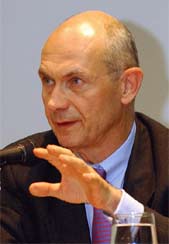|
 World Trade Organisation (WTO) director general Pascal Lamy said it is still possible that trade ministers could meet this month to work out the outlines of an agreement in the Doha Round of world trade talks, which has been long delayed since its launch in 2001. World Trade Organisation (WTO) director general Pascal Lamy said it is still possible that trade ministers could meet this month to work out the outlines of an agreement in the Doha Round of world trade talks, which has been long delayed since its launch in 2001.
"There are the political and technical conditions to wrap things up in 2008," Lamy told the Les Echos newspaper, adding that the accord needed to be struck this month or next to give time for the final texts to be prepared. The WTO's Doha negotiations for a global trade deal were launched seven years ago to help poor countries export more and to boost the global economy. However, progress has been impeded by disagreements over how to lower export barriers. As of 2008, talks have stalled over a divide between the developed nations led by the European Union, the United States and Japan and the major developing countries (represented by the G20 developing nations), led and represented mainly by India, Brazil, China and South Africa. At the latest meet in June 2007, negotiations within the Doha round broke down at a conference in Potsdam, Germany, as a major impasse occurred between the US, the European Union (EU), India and Brazil. The main disagreement was over opening up agricultural and industrial markets in various countries and also how to cut rich nation farm subsidies. The WTO wants to hold ministerial talks this month to secure a breakthrough in the trade round. Although no date has yet been set for this meeting, Lamy said it could still happen.
| The Doha Round began with a
ministerial-level meeting in Doha, Qatar in 2001.
Subsequent ministerial meetings took place in Cancún,
Mexico (2003), and Hong Kong, China (2005). Related
negotiations took place in Geneva, Switzerland (2004),
Paris, France (2005), and again in Geneva (2006).
|
"It is still feasible. The major political leaders are all agreed that we need to complete the negotiations by the end of the year," Lamy said. In a related development, Indian trade experts yesterday said they agree with Lamy's prognosis that the world food crisis can be resolved through a global trade agreement that centres on correcting free market distortions. Lamy, while speaking on the global food crisis earlier this month, had said, "Although the WTO cannot provide anything immediate to help solve the current crisis, it can, through the Doha Round negotiations, provide medium to long-term solutions. A WTO deal could help soften the impact of high prices by tackling the systemic distortions in the international market for food." Biswajit Dhar, head of the Centre for WTO Studies, Indian Institute of Foreign Trade, felt that if an agreement were reached it would provide certainty in terms of policy regime for the farmers in developing countries. "A fair trade will encourage farmers from the developing countries to invest more in expanding agriculture production," he said.
|